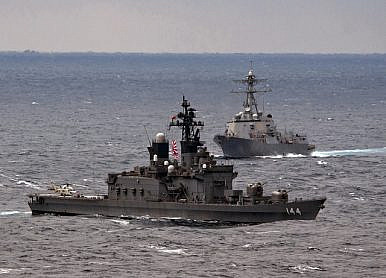http://thediplomat.com/2016/09/japan-set-to-intensify-south-china-sea-involvement/

In recent remarks, Japanese Defense Minister Tomomi Inada reiterated the Japan Maritime Self-Defense Force’s (MSDF) intention to continue cooperation with the United States in the South China Sea. In a speech delivered at the Center for Strategic and International Studies, a Washington, DC-based think tank, earlier this week, Inada also expressed concerned about China’s behavior in the East and South China Seas.
최근 주목을 끄는 것은 일본 국방장관인 이나다 도오미의 남중국해에서 자위대는 미군과 협력을 계속하겠다고 되풀이해서 말한 것이다.
이번 주 초 워싱턴 DC-싱크탱크인 전략연구센터에서의 한 연설에서 이나다는 남중국해에서의 중국의 행동에 우려한다고 말했다.
(참고로...전직 변호사였던 이 여성장관을 주목해야 합니다. 그녀는 남경대학살이 허구며 위안부는 강제가 아닌 합법적으로 이루어졌으며 소녀상은 철거해야 하고 일본은 잘못된 역사를 학생들에게 가르치고 있어 새롭게 고쳐야 한다고 주장하는 자입니다. 클링천 시절 영변핵시설을 선제 타격할 것을 계획했던 현재의 미 국방장관 에쉬 카터만큼이나 호전적인 인물로 차기 아베 후계자로 거론되는 인물입니다.)

침략은 평가의 문제다라고 하는 자임...
Inada outlined three particular areas where Japan will continue to deepen its involvement in the South China Sea:
이나다는 일본이 계속 남중국해에 깊게 관련하게 될 세 지역의 윤곽을 그렸다.
Japan on its part will increase its engagement in the South China Sea through, for example, Maritime Self Defense Force joint training cruises with the U.S. Navy, bilateral and multi-lateral exercises with regional navies, as well as providing capacity building assistance to coastal nations.
남중국해의 일원인 일본은 이 지역의 대한 원조뿐만 아니라
자위대와 이 지역 나라들과의 상호 혹은 다자간 연합훈련, 미해군과의 연합 훈련 항해를 통해 남중국해 개입을 증가시킬 것이다.
“I would like to underline my government’s resolve to protect our territorial integrity and sovereignty,” said Inada. “To this end, we will continue our own defense efforts and also maintain and enhance the Japan-U.S. alliance.”
Inada, newly appointed as defense minister and the second woman to hold that post in Japan, has been described as a potential candidate to succeed Japanese Prime Minister Shinzo Abe.
"나는 우리 영토의 고결과 주권을 보호하기 위한 우리 정부의 결심을 보여주고 싶다."고 이나다는 말했다.
"끝까지 우리는 우리 자신의 안보노력을 계속할 것이고 일본과 미국의 동맹을 유지 강화할 것이다."
최근에 여성으로는 두 번째로 국방장관에 임명된 이나다는 아베의 후계자로 유력한 인물이다.
Japan’s involvement in the South China Sea has drawn China’s attention. Beijing recently warned Tokyo that it would risk China’s wrath by engaging in freedom of navigation patrols (FONOPs) in the region. Ambassador Cheng Yonghua, China’s envoy to Japan, reportedly told Japanese officials that Japanese participation in U.S. Navy-led FONOPs would cross a “red line.”
남중국해의 일본의 개입은 중국의 주의를 끌고 있다. 중국은 최근에 이 지역에서의 항해의 자유(미국은 해양법 조약에 가입하지 않은 나라로 어느 나라나 항해의 자유라는 이름으로 간섭 없이 항해하고 있음)라는 명목의 순찰로 중국을 분노케 하고 있다고 일본에 경고했다.
일본주재 중국대사관은 미국 주도의 자유항해에 일본이 개입하는 것은 빨간선을 넘는 것이라고 계속해서 말했다.
China has reiterated its operation to Japanese involvement in the South China Sea on other occasions. “We are firmly opposed to Japanese attempts to send its self defense forces to join the so-called Freedom of Navigation operations by the U.S. in the South China Sea,” Colonel Wu Qian, spokesperson for the Chinese Ministry of National Defense, remarked at an August press conference.
Inada, rebuking China’s warnings, declared her support for the U.S. Navy’s ongoing patrols: “In this context, I strongly support the U.S. Navy’s freedom-of-navigation operations, which go a long way to upholding the rules-based international maritime order.” Inada stressed the importance of upholding international law in the South China Sea, saying that if “rule-bending” is permitted to go unchallenged, the “consequences could become global.”
이나다는 중국의 경고를 비난하면서 미해군의 계속된 순항을 지지한다고 선언했다.
"이 문맥에서, 나는 규칙에 기초한 국제 해양법을 지키며 오래 지속돼 온 미해군의 자유항해를 강하게 지지한다."
이나다는 남중국해에서 국제법을 따르는 것의 중요성을 강조하면서 법의 복종이 의심할 바 없는 것이라면 그 결과(판결)는 세계적인 게 될 수 있다.
Japan held its first-ever bilateral drill in the South China Sea with the United States Navy last October. Incidentally, this drill took place just days after the United States carried out its first FONOP within 12 nautical miles of Subi Reef and other disputed features in the Spratly Islands. (Subi Reef is the site of one of seven artificial islands constructed by China since 2013.)
일본은 지난 해 10월에 미해군과 남중국해에서 첫 훈련을 했다.
그런데, 이 훈련은 수비암초(2013년 이래 중국이 만든 7개의 인공섬 중의 하나)에서 12해리 내에서 미군이 첫 자유항해를 시작한 후 며칠 안 돼서 수행했다.
Tokyo’s resolve to intensify its maritime involvement in the South China Sea demonstrates the continuing salience of the region for Japanese strategy despite Japan’s lack of geographic proximity to the area. Not only does Tokyo benefit from the preservation of free navigation in the South China Sea, but Japan, as a net importer of fossil fuels, is dependent on open sea lanes across the Asia-Pacific for its energy needs.
남중국해의 일본 개입을 강화하기 위한 일본의 결심은 이 지역에 대한 접근성이 떨어짐에도 불구하고 일본 전략을 계속해서 펼치고 있는데서 볼 수 있다.
일본은 남중국해에서 자유항해를 유지로부터 이득이 있을 뿐만 아니라 화석연료 수입과 같은 에너지 수요 때문에 아시아 태평양을 가로지르는 열린 항로에 의존이 필요하다.
